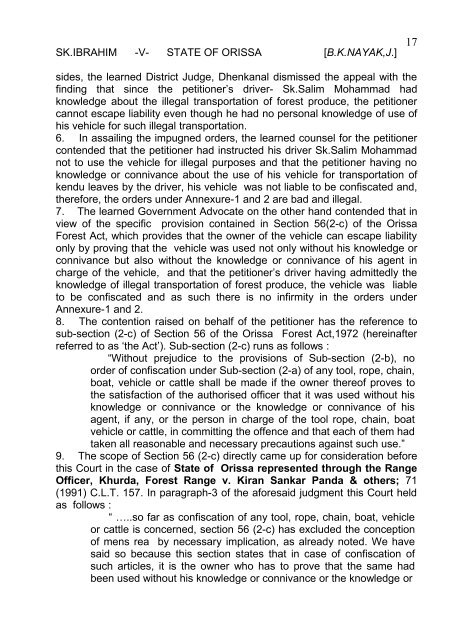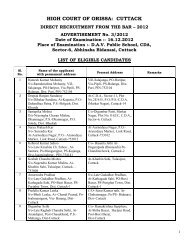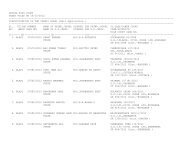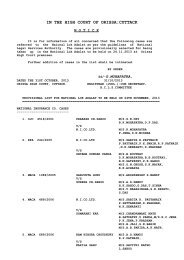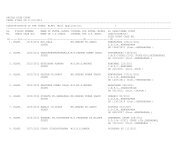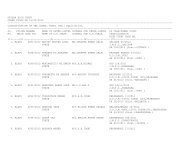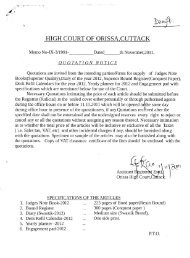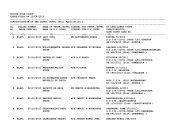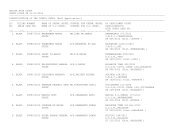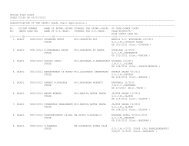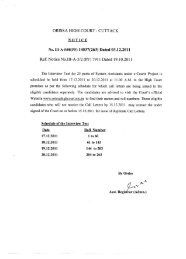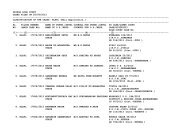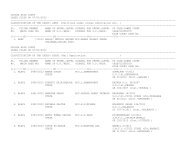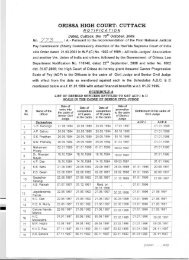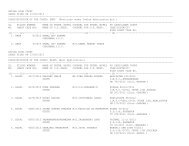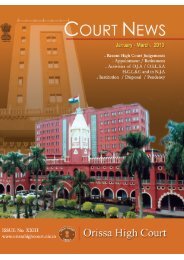ORIGINAL JURISDICTION - Orissa High Court
ORIGINAL JURISDICTION - Orissa High Court
ORIGINAL JURISDICTION - Orissa High Court
Create successful ePaper yourself
Turn your PDF publications into a flip-book with our unique Google optimized e-Paper software.
SK.IBRAHIM -V- STATE OF ORISSA [B.K.NAYAK,J.]<br />
sides, the learned District Judge, Dhenkanal dismissed the appeal with the<br />
finding that since the petitioner’s driver- Sk.Salim Mohammad had<br />
knowledge about the illegal transportation of forest produce, the petitioner<br />
cannot escape liability even though he had no personal knowledge of use of<br />
his vehicle for such illegal transportation.<br />
6. In assailing the impugned orders, the learned counsel for the petitioner<br />
contended that the petitioner had instructed his driver Sk.Salim Mohammad<br />
not to use the vehicle for illegal purposes and that the petitioner having no<br />
knowledge or connivance about the use of his vehicle for transportation of<br />
kendu leaves by the driver, his vehicle was not liable to be confiscated and,<br />
therefore, the orders under Annexure-1 and 2 are bad and illegal.<br />
7. The learned Government Advocate on the other hand contended that in<br />
view of the specific provision contained in Section 56(2-c) of the <strong>Orissa</strong><br />
Forest Act, which provides that the owner of the vehicle can escape liability<br />
only by proving that the vehicle was used not only without his knowledge or<br />
connivance but also without the knowledge or connivance of his agent in<br />
charge of the vehicle, and that the petitioner’s driver having admittedly the<br />
knowledge of illegal transportation of forest produce, the vehicle was liable<br />
to be confiscated and as such there is no infirmity in the orders under<br />
Annexure-1 and 2.<br />
8. The contention raised on behalf of the petitioner has the reference to<br />
sub-section (2-c) of Section 56 of the <strong>Orissa</strong> Forest Act,1972 (hereinafter<br />
referred to as ‘the Act’). Sub-section (2-c) runs as follows :<br />
“Without prejudice to the provisions of Sub-section (2-b), no<br />
order of confiscation under Sub-section (2-a) of any tool, rope, chain,<br />
boat, vehicle or cattle shall be made if the owner thereof proves to<br />
the satisfaction of the authorised officer that it was used without his<br />
knowledge or connivance or the knowledge or connivance of his<br />
agent, if any, or the person in charge of the tool rope, chain, boat<br />
vehicle or cattle, in committing the offence and that each of them had<br />
taken all reasonable and necessary precautions against such use.”<br />
9. The scope of Section 56 (2-c) directly came up for consideration before<br />
this <strong>Court</strong> in the case of State of <strong>Orissa</strong> represented through the Range<br />
Officer, Khurda, Forest Range v. Kiran Sankar Panda & others; 71<br />
(1991) C.L.T. 157. In paragraph-3 of the aforesaid judgment this <strong>Court</strong> held<br />
as follows :<br />
“ …..so far as confiscation of any tool, rope, chain, boat, vehicle<br />
or cattle is concerned, section 56 (2-c) has excluded the conception<br />
of mens rea by necessary implication, as already noted. We have<br />
said so because this section states that in case of confiscation of<br />
such articles, it is the owner who has to prove that the same had<br />
been used without his knowledge or connivance or the knowledge or<br />
17


